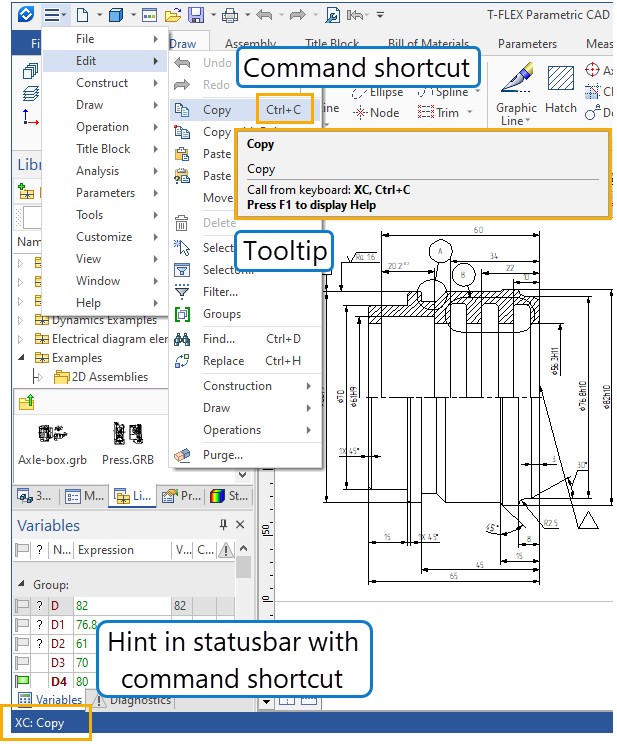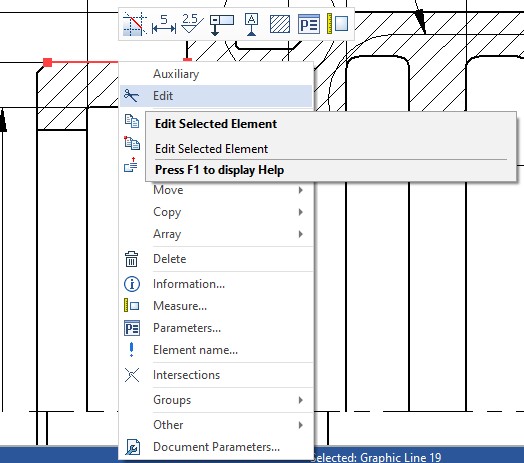Work with Commands |
  
|
Commands call
There are several ways to call a command in T-FLEX CAD: select from the text drop-down menu, select from the ribbon or instrumental toolbar, select from contextual menu, or type the hotkey sequence in the status bar. Some commands can also be called using the hotkey combinations.
Calling a command from the text drop-down menu
Point the cursor at a text menu item and click ![]() . A drop-down menu with a set of commands will appear. Move the cursor to the desired command and click
. A drop-down menu with a set of commands will appear. Move the cursor to the desired command and click ![]() .
.
Calling a command from the ribbon or instrumental toolbar
Move the cursor to the icon of the desired command and click ![]() . You can call a command from the pictographic menu regardless of whether another command is being executed or not.
. You can call a command from the pictographic menu regardless of whether another command is being executed or not.
Calling a command from the status bar
It is performed by setting one, two, or three letters of the name of the required command. T-FLEX CAD automatically identifies the command you enter. For example, the Construct line command is automatically called after clicking <L>. You can only call a command from the status bar when none of the system's commands are loaded (the status bar is empty).
Icon |
Ribbon |
|---|---|
|
Draw > Construct > Line |
Keyboard |
Textual Menu |
<L> |
Construct > Line |
This means, you can call the command by different ways:
•You can press <L>;
•You can select Construction in textual menu, and then find row with Line command;
•Or you can simple press ![]() on pictographic menu.
on pictographic menu.
In each system element creation command, you can call the corresponding element editing command by pressing <F4>. After you exit editing commands the system to resume execution of the interrupted command to create.
When working with T-FLEX CAD, you can see the key sequence corresponding to the command in the status bar tooltips field when you select a command in the text menu or in the toolbar. If a key combination is set for a command, it is indicated in the text menu to the right of the command name. You can change or set a combination for any command. For a detailed description, see the section system configuration, section "Configuring toolbars and keyboard".
When specifying a command name using the keyboard, it is necessary that the system is not in a state of execution of another command (the status line should be empty).

It is convenient to use the context menu to run some commands. It is called up by pressing ![]() after selecting one or more elements. The context menu contains a list of commands that can be performed with this choice.
after selecting one or more elements. The context menu contains a list of commands that can be performed with this choice.

To cancel a command, it is usually enough to ![]() or <Esc>. There are complex commands that require 2, 3, or even 4 clicks to cancel, but this is an exception. In these commands, a single right-click takes you one step back or cancels the selection of items. You can also use the
or <Esc>. There are complex commands that require 2, 3, or even 4 clicks to cancel, but this is an exception. In these commands, a single right-click takes you one step back or cancels the selection of items. You can also use the ![]() icon in the auto menu. Canceling a command clears the selection. If a command is launched within another command you can either exit them one by one by pressing <Esc> several times, or press <Shift>+<Esc> to exit all commands at once.
icon in the auto menu. Canceling a command clears the selection. If a command is launched within another command you can either exit them one by one by pressing <Esc> several times, or press <Shift>+<Esc> to exit all commands at once.